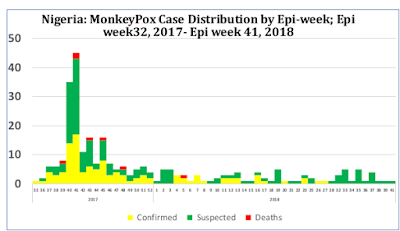#13,622
It's been 5 weeks since Nigeria last updated their Monkeypox situation (see Nigeria: CDC Monkeypox Update Epi Week 37), and while the number of cases being captured by local surveillance remains small (see chart above), we've seen three exported cases (2 to the UK, 1 to Israel) in the past two months.
Nigeria reported their first outbreak of Monkeypox in nearly 40 years in the fall of 2017, one which appeared to be about over in February. Until the September update, Nigeria issued their last outbreak update in epi week 9 of 2018.Last week the CDC issued a level-2 travel advisory to Nigeria, the ECDC has published a Rapid Risk Assessment, and two weeks ago the we saw a WHO: Monkeypox Update & Risk Assessment - Nigeria.
Despite the unusual arrival of three monkeypox infected travelers to two different countries over the past 60 days, and the international attention being paid, Nigeria's week 41 epidemiological report shows a surprisingly small number of new cases (suspected or confirmed) reported over the past month.
HIGHLIGHT
- The NCDC is following up closely with the Ministry of Health Israel following the report of a confirmed monkeypox case in Israel on 13 October with a travel history from Nigeria.
- Ten new suspected cases of monkeypox were reported from Ebonyi (4), Rivers (2), Bayelsa (4)
- Eight patient samples from the cluster of ten suspected cases with epidemiological linkages to the first case in the UK were tested and found to be negative for monkeypox but positive for Chickenpox. Two cases will require further investigation.
- Thirteen contacts of the first UK confirmed case were followed up in Nigeria for a period of 21 days. None became symptomatic.
- NCDC continued to collaborate with PHE to investigate and strengthen control measures related to the two cases confirmed in UK.
- A total of 86 cases have been reported in 2018 from 16 States (Rivers, Akwa-Ibom, Bayelsa, Cross River, Delta, Ebonyi, Edo, Enugu, Imo, Lagos, Nasarawa, Oyo, Abia, Anambra, Plateau and the FCT); 38 are confirmed, one probable, ten awaiting results, and two deaths.
- One hundred and sixteen (116) confirmed and 280 suspected cases have been recorded from the beginning of the outbreak in September, 2017
- Genetic sequencing suggests multiple sources of introduction of monkeypox virus into the human population with some evidence of human to human transmission.
- Males are more affected with 79% of confirmed cases.
- The most affected age group in confirmed cases is 21-40 years (Median Age = 31).
- Nigeria continues to report sporadic cases since the beginning of 2018.
Nigeria is currently dealing with a number of other infectious disease outbreaks, including Lassa Fever, Yellow Fever, and Cholera. That, when combined with the Boko Haram conflict in the northeast, and ongoing political and societal challenges, likely hinders the CDC's ability to conduct surveillance in some parts of the country.
Fortunately, the West African Monkeypox virus is considered to be less virulent, and less easily transmitted, than its Central African counterpart (cite).The Monkeypox virus, however - particularly the Central African clade - remains a genuine public health concern, albeit not as horrific as the tabloid press would have us believe.
Some past studies and reviews of this threat include:
MMWR: Emergence of Monkeypox — West and Central Africa, 1970–2017
The Lancet: Genomic Characterisation Of Human Monkeypox Virus In Nigeria
EID Journal:Extended H-2-H Transmission during a Monkeypox Outbreak
Genomic Variability of Monkeypox Virus among Humans, Democratic Republic of the Congo

